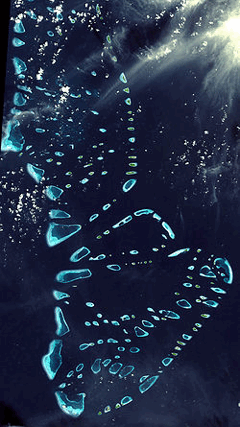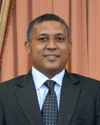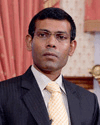Wet and Wild
Air Date: Week of October 16, 2009

Satellite photo of the Maldives, a group of atolls (Courtesy of Wikipedia)
In the tiny island nation of the Maldives the threats from climate change are visible. Averaging about two meters above sea level, the Maldives is bracing itself for rising seas. So the president has come up with a splashy stunt: holding his next cabinet meeting underwater. Host Jeff Young talks with Mohamed Aslam, the Minister of the Environment about this gathering.
Transcript
YOUNG: Global warming is the stuff of dry political debate in Washington – but for the Maldive islands it’s as unavoidable as the rising seas that surround them. This nation of low-lying coral atolls sits about 500 miles southwest of the southern tip of India. Its government is deeply concerned about climate change. Mohamed Aslam is the Minister of the Environment for the Maldives – and – Minister, I hear your government’s upcoming cabinet meeting about climate change will make quite a splash.
ASLAM: Yes, I think it’s the first time any Cabinet is going to have a meeting underwater, I guess.
YOUNG: How do you carry out a meeting underwater?

Mr. Mohamed Aslam, Minister of Housing, Transport and Environment
ASLAM: Of course, we don’t have gills. We haven’t evolved to have gills yet, so we have to have breathing equipment with scuba gear and then we will talk to each other by sign language, and we will have a statement sign underwater.
YOUNG: Tell us a bit about the Maldives – how high does your land rest above sea level?
ASLAM: In terms of its height above mean sea level, it doesn’t rise anything above two meters above sea level, so if the sea level rises as predicted in the next hundred years to 50 centimeter rise that means much of our land would be underwater, and before going underwater a lot of things are going to happen. There would be salinization of the fresh groundwater we have on the islands, which in turn, would kill much of the vegetation, at least anything that would be edible. So, going with the waves would be the doomsday scenario, but before the doomsday, there will be a lot of things that will make this place uninhabitable.

Satellite photo of the Maldives, a group of atolls (Photo: Wikipedia)
YOUNG: What’s the mood among people in the Maldives? What do you hear from ordinary folks around the country?
ASLAM: Some of the people understand that this is going to happen. Some maybe don’t understand that it is going to happen. It’s hard for some people to believe that children may not be living on the land where their forefathers lived and where they are living. This issue of climate change seems to be something similar to people who smoke, where the smokers know that they are going to die of smoking, but they still continue to smoke.
So, it’s something similar to that sort of thing, I think. But the majority of the Maldivians do understand it is going to happen. There is one other thing we want to send out to the world - we don’t want to leave this place, this is where we were born, this is where our forefathers were born and we want our children to live here and this is home for us. We don’t want to leave this place.

Mr. Mohamed Nasheed, President of the Republic of Maldives
YOUNG: I recall hearing the Maldives president, Mr. Nasheed, give a very passionate speech at the recent climate summit at the United Nations. However, I was wondering, what is the nation of the Maldives doing itself to bring down or limit greenhouse gas emissions?
ASLAM: We don’t emit anything significant, there’s 350,000 people, there isn’t anything industrial that emits anything much. Nonetheless, there is a policy that we have announced, the president has announced, trying to go carbon neutral in ten years.
Now, our point of going carbon neutral is not that we believe that us going carbon neutral is going to save the world. But we want to send out again a message to the world, look we know we are in the front line of this battle, we want to do everything in our capacity to lead by example.
But what I would like to tell the global community is that people should look at us as the mirror to see their own future. We might be the first people who will be facing this, but we won’t be the last. If this happens to us today, it’s going to happen to you tomorrow. And people should not be hypocritical about this, people should meet words with actions, and it’s not really helping us, it’s really helping yourself; it’s saving the world.
YOUNG: Maldives Environment Minister, Mohamed Aslam, telling us about the government’s underwater cabinet meeting. Thank you very much, sir.
ASLAM: Thanks very much, I hope the message goes out loud and clear.
Links
Living on Earth wants to hear from you!
Living on Earth
62 Calef Highway, Suite 212
Lee, NH 03861
Telephone: 617-287-4121
E-mail: comments@loe.org
Newsletter [Click here]
Donate to Living on Earth!
Living on Earth is an independent media program and relies entirely on contributions from listeners and institutions supporting public service. Please donate now to preserve an independent environmental voice.
NewsletterLiving on Earth offers a weekly delivery of the show's rundown to your mailbox. Sign up for our newsletter today!
 Sailors For The Sea: Be the change you want to sea.
Sailors For The Sea: Be the change you want to sea.
 The Grantham Foundation for the Protection of the Environment: Committed to protecting and improving the health of the global environment.
The Grantham Foundation for the Protection of the Environment: Committed to protecting and improving the health of the global environment.
 Contribute to Living on Earth and receive, as our gift to you, an archival print of one of Mark Seth Lender's extraordinary wildlife photographs. Follow the link to see Mark's current collection of photographs.
Contribute to Living on Earth and receive, as our gift to you, an archival print of one of Mark Seth Lender's extraordinary wildlife photographs. Follow the link to see Mark's current collection of photographs.
 Buy a signed copy of Mark Seth Lender's book Smeagull the Seagull & support Living on Earth
Buy a signed copy of Mark Seth Lender's book Smeagull the Seagull & support Living on Earth

